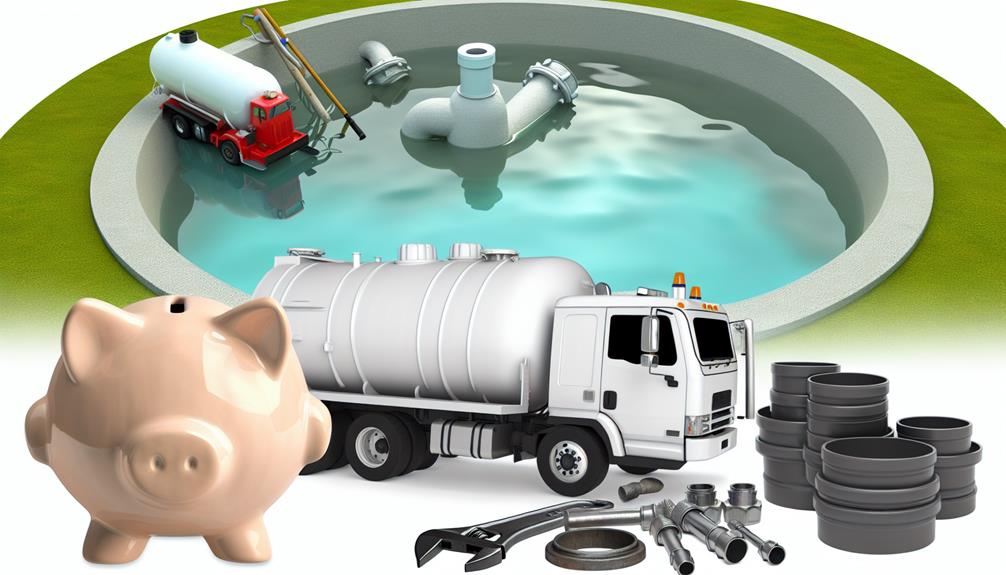Discover how to protect your septic system from breakdown with...
Read MoreYou & Your Septic Tank
Why Does Professional Septic Tank Pumping Cost Vary?
Our professional septic service team offers comprehensive septic tank pumping services to keep your system running smoothly. Get a FREE Quote Today.

Why Does Professional Septic Tank Pumping Cost Vary?
Just as the price of a cup of coffee can differ from one cafe to another, so too can the cost of professional septic tank pumping.
You might be wondering why this is the case. Well, it’s not a simple one-size-fits-all answer. Various factors come into play, such as the size of your septic tank, its accessibility, the level of waste, and even your geographical location.
But that’s not all. There are other, more nuanced considerations that can significantly impact the cost.
Intriguing, isn’t it? Stay with us as we unpack these variables one by one, to help you navigate the intricacies of professional septic tank pumping costs.
Key Takeaways
- The cost of professional septic tank pumping can vary based on factors such as the size of the tank, distance to disposal site, local regulations, and the quality of pumping equipment.
- Competition among service providers and geographic disparities can also contribute to cost differences.
- Strategies to save on septic tank pumping include budget planning, regular maintenance, DIY alternatives for certain tasks, and cost analysis of routine maintenance.
- Routine maintenance is important as it reduces buildup, prevents system failure, identifies issues early, and prevents clogs, ultimately saving costs in the long run.
Understanding Septic Tank Pumping

To truly grasp the concept of septic tank pumping, you need to understand its function and the critical role it plays in maintaining your home’s waste management system. The tank serves as a holding and processing area for waste, separating solid from liquid and allowing the latter to flow into the drain field.
Pumping frequency is fundamental. Generally, every 3-5 years is recommended, but frequency depends on factors like the tank’s size, the number of occupants in your home, and the volume of wastewater generated. You’re dealing with a delicate balance; pump too often, and you’re wasting money; not frequently enough, and you risk a failure that could damage your system and environment.
It’s tempting to consider a DIY approach to save on costs, but the risks outweigh possible benefits. Septic pumping involves specialized equipment and knowledge of local regulations. Mishandling can lead to spills, exposure to harmful bacteria, and damage to the tank or drain field. So, it’s always advisable to hire professionals.
Understanding septic tank pumping means recognizing its complexity and the importance of regular, professional maintenance.
Factors Influencing Pumping Costs
Often, you’ll find that the cost of septic tank pumping isn’t fixed, but rather influenced by a variety of factors, including your tank’s size, the distance to the disposal site, and local regulations. These elements can significantly affect the total expense.
The size of your septic tank matters because larger tanks require more time and resources to pump, which naturally increases the cost. Similarly, if your property is far from the disposal site, transportation costs rise, which the provider may pass onto you. Local regulations can also impact costs. Some areas have specific disposal fees or require certain permits, all adding to your bill.
One factor you mightn’t have considered is the quality of the pumping equipment used. High-quality, modern equipment can pump septic tanks more efficiently, reducing time and labor costs. However, this equipment is more expensive, and those costs can be reflected in your bill.
Your geographic location plays a significant role too. In areas where professional septic services are scarce, you might pay more due to lack of competition. Similarly, in regions with higher living costs, you’ll likely face higher septic pumping charges.
Understanding these factors can help you anticipate and manage your septic tank pumping costs.
Cost Differences Between Providers

Just as every septic tank’s needs are unique, you’ll find significant cost variations among different service providers. This disparity is often influenced by factors such as provider competition and geographic disparities.
In areas where multiple service providers operate, the competition often drives down costs. It’s a matter of supply and demand. When there’s a high concentration of providers, they’re more likely to lower their prices to attract more customers. It’s a competitive market, and you’re the benefactor.
On the other hand, geographic disparities can lead to higher costs. If you live in a remote area, with fewer service providers, you’re likely to pay more. The travel distance, coupled with the lack of competition, allows providers to charge more.
Similarly, if you reside in an area with unique environmental regulations or challenging terrain, the cost may increase due to the complexity of the task. Providers may need specialist equipment or specific permits, adding to the overall cost.
Saving on Septic Tank Pumping
Despite the inherent cost variations discussed, you don’t have to break the bank when it comes to septic tank pumping; there are effective strategies you can employ to save on these essential services.
Budget planning is your first line of defense. By setting aside a portion of your funds for septic maintenance, you’re less likely to feel the pinch when the time comes for pumping.
Regular maintenance is also a cost-effective approach. By having your tank inspected and pumped every 3-5 years, you can prevent minor issues from escalating into major, costly repairs. While this may seem counterintuitive, the cost of periodic pumping is significantly less than the expense of replacing a failed septic system.
If you’re handy and willing to get your hands dirty, DIY alternatives can also help trim costs. Certain tasks such as inspecting the drain field and tank, and cleaning the effluent filter, can be done without professional assistance. However, it’s crucial to remember that septic system work can be dangerous without proper training and equipment.
Therefore, leave the complex tasks to the pros to avoid causing more harm than good.
Routine Maintenance and Cost Impact

Regular upkeep of your septic system can significantly reel in the overall costs associated with septic tank operations and repairs. Implementing preventive measures can extend the longevity of your system and help avoid large repair bills. By conducting a cost analysis, you’ll see that routine maintenance can be a cost-effective solution in the long run.
Let’s delve into the three main factors in the cost impact of routine maintenance:
| Preventive Measures | Cost Impact | Routine Maintenance |
|---|---|---|
| Regular pumping | Reduces buildup and prevents system failure | Varies depending on size of tank and frequency |
| Inspection | Identifies issues early, reducing repair costs | Typically conducted every 3-5 years |
| Use of additives | Can maintain system balance and prevent clogs | Cost depends on type of additives used |
Regular pumping not only keeps your system running efficiently but also reduces the risk of a septic disaster. Regular inspection can catch potential problems before they become costly repairs. The use of additives can help maintain the balance of your system and prevent clogs. These measures, while requiring some investment, can help you avoid the larger expenses of a septic system failure. Remember, preventive maintenance is often cheaper than a cure.
Frequently Asked Questions
What Are the Environmental Implications of Septic Tank Pumping?
When you pump your septic tank, it aids in pollution prevention. However, improper disposal can impact the ecosystem negatively. It’s crucial you’re mindful of the environmental implications of septic tank pumping.
How Long Does the Septic Tank Pumping Process Usually Take?
The pumping process’s duration hinges on your tank’s size and fullness. Generally, it’s a few hours. Your pumping frequency and maintenance practices can influence this. Regular upkeep can speed up the process, saving you time.
Can Septic Tank Pumping Affect My Home’s Landscaping or Yard?
Yes, it can. If the pumping frequency’s too high, your yard might get damaged. You’ll also incur landscaping repair costs. So, it’s crucial to balance the pumping frequency to avoid unnecessary yard disturbances.
Is There Any Risk Involved in DIY Septic Tank Pumping?
Yes, there’s risk. Pumping difficulties can lead to damaging your system. Proper safety measures aren’t easy to implement without professional training. Also, mishandling can cause environmental hazards and hefty fines. It’s best to hire a professional.
Are There Any Specific Regulations or Codes I Need to Be Aware of When Getting a Septic Tank Pumped?
Yes, you must be aware of regulation compliance. Local codes dictate specific methods for septic tank pumping. Violating these can lead to fines. It’s crucial you hire a professional familiar with your area’s regulations.
Conclusion
In conclusion, septic tank pumping costs can vary due to several factors. It’s not just about the size of your tank or its location, but also about the provider’s expertise and overhead costs.
Yes, it may seem pricey, but remember, regular maintenance can save you from costlier repairs down the line. It’s not just about saving money now, but investing in the long-term health of your septic system.
You may also like...
Why Are DIY Fixes Essential for Septic Tank Pumping?
Tap into the importance of DIY fixes for septic tank...
Read MoreUnveiling the Average Costs of Septic Tank Pumping
Master the mysteries of septic tank pumping costs and avoid...
Read More
The Best Septic Tank Pumping Services Near You

Answer Some Questions
Let us know about your needs so we can find you the right septic tank pros.

Get Quotes
We will put you in touch with the right septic tank pros for your job and location.

Hire Right
Compare quotes, message or call pros, and hire only when ready.



